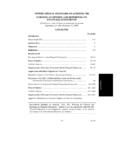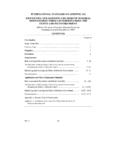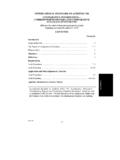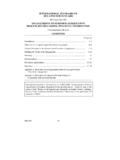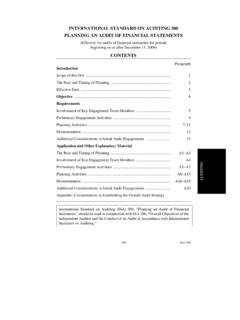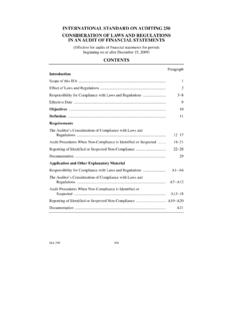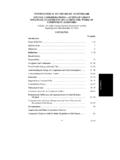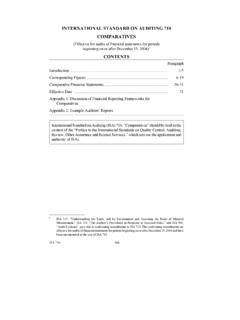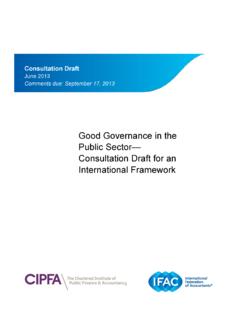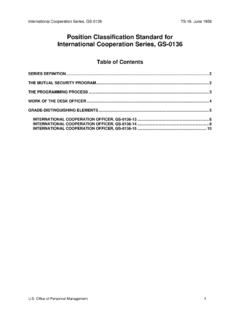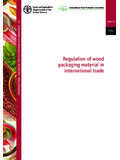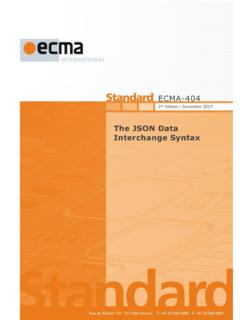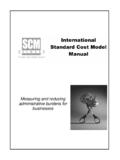Transcription of INTERNATIONAL STANDARD ON REVIEW …
1 ISRE 2400 230 INTERNATIONAL STANDARD ON REVIEW ENGAGEMENTS 2400 (Previously ISA 910) ENGAGEMENTS TO REVIEW FINANCIAL STATEMENTS (Effective for reviews of financial statements for periods beginning on or after December 15, 2006) CONTENTS Paragraph Introduction .. 1 2 Objective of a REVIEW Engagement .. 3 General Principles of a REVIEW Engagement .. 4 7 Scope of a REVIEW .. 8 Moderate Assurance .. 9 Terms of Engagement .. 10 12 Planning .. 13 15 Work Performed by Others .. 16 Documentation .. 17 Procedures and Evidence .. 18 22 Conclusions and Reporting .. 23 28 Appendix 1: Example of an Engagement Letter for a REVIEW of Financial Statements Appendix 2: Illustrative Detailed Procedures that may be Performed in an Engagement to REVIEW Financial Statements Appendix 3: Form of Unqualified REVIEW Report Appendix 4: Examples of REVIEW Reports Other than Unqualified INTERNATIONAL STANDARD on REVIEW Engagements (ISRE) 2400, Engagements to REVIEW Financial Statements should be read in the context of the Preface to the INTERNATIONAL standards on Quality Control, Auditing, REVIEW , Other Assurance and Related Services, which sets out the application and authority of ISREs.
2 ENGAGEMENTS TO REVIEW FINANCIAL STATEMENTS ISRE 2400 231 REVIEW Introduction 1. The purpose of this INTERNATIONAL STANDARD on REVIEW Engagements (ISRE) is to establish standards and provide guidance on the practitioner s professional responsibilities when a practitioner, who is not the auditor of an entity, undertakes an engagement to REVIEW financial statements and on the form and content of the report that the practitioner issues in connection with such a REVIEW . A practitioner, who is the auditor of the entity, engaged to perform a REVIEW of interim financial information performs such a REVIEW in accordance with ISRE 2410, REVIEW of Interim Financial Information Performed by the Independent Auditor of the Entity. 2. This ISRE is directed towards the REVIEW of financial statements. However, it is to be applied, adapted as necessary in the circumstances, to engagements to REVIEW other historical financial information. Guidance in the INTERNATIONAL STANDARD on Auditing (ISAs) may be useful to the practitioner in applying this ISRE.
3 Objective of a REVIEW Engagement 3. The objective of a REVIEW of financial statements is to enable a practitioner to state whether, on the basis of procedures which do not provide all the evidence that would be required in an audit, anything has come to the practitioner s attention that causes the practitioner to believe that the financial statements are not prepared, in all material respects, in accordance with the applicable financial reporting framework (negative assurance). General Principles of a REVIEW Engagement 4. The practitioner should comply with the Code of Ethics for Professional Accountants issued by the INTERNATIONAL Ethics standards Board for Accountants (the IESBA Code). Ethical principles governing the practitioner s professional responsibilities are: (a) Independence; (b) Integrity; (c) Objectivity; (d) Professional competence and due care; (e) Confidentiality; (f) Professional behavior; and (g) Technical standards .
4 Paragraph 2 of this ISRE was amended in December 2007 to clarify the application of the ISRE. ENGAGEMENTS TO REVIEW FINANCIAL STATEMENTS ISRE 2400 2325. The practitioner should conduct a REVIEW in accordance with this ISRE. 6. The practitioner should plan and perform the REVIEW with an attitude of professional skepticism recognizing that circumstances may exist which cause the financial statements to be materially misstated. 7. For the purpose of expressing negative assurance in the REVIEW report, the practitioner should obtain sufficient appropriate evidence primarily through inquiry and analytical procedures to be able to draw conclusions. Scope of a REVIEW 8. The term scope of a REVIEW refers to the REVIEW procedures deemed necessary in the circumstances to achieve the objective of the REVIEW . The procedures required to conduct a REVIEW of financial statements should be determined by the practitioner having regard to the requirements of this ISRE, relevant professional bodies, legislation, regulation and, where appropriate, the terms of the REVIEW engagement and reporting requirements.
5 Moderate Assurance 9. A REVIEW engagement provides a moderate level of assurance that the information subject to REVIEW is free of material misstatement, this is expressed in the form of negative assurance. Terms of Engagement 10. The practitioner and the client should agree on the terms of the engagement. The agreed terms would be recorded in an engagement letter or other suitable form such as a contract. 11. An engagement letter will be of assistance in planning the REVIEW work. It is in the interests of both the practitioner and the client that the practitioner sends an engagement letter documenting the key terms of the appointment. An engagement letter confirms the practitioner s acceptance of the appointment and helps avoid misunderstanding regarding such matters as the objectives and scope of the engagement, the extent of the practitioner s responsibilities and the form of reports to be issued. 12. Matters that would be included in the engagement letter include the following: The objective of the service being performed.
6 Management s responsibility for the financial statements. The scope of the REVIEW , including reference to this ISRE (or relevant national standards or practices). Unrestricted access to whatever records, documentation and other information requested in connection with the REVIEW . ENGAGEMENTS TO REVIEW FINANCIAL STATEMENTS ISRE 2400 233 REVIEW A sample of the report expected to be rendered. The fact that the engagement cannot be relied upon to disclose errors, illegal acts or other irregularities, for example, fraud or defalcations that may exist. A statement that an audit is not being performed and that an audit opinion will not be expressed. To emphasize this point and to avoid confusion, the practitioner may also consider pointing out that a REVIEW engagement will not satisfy any statutory or third party requirements for an audit. An example of an engagement letter for a REVIEW of financial statements appears in Appendix 1 to this ISRE. Planning 13.
7 The practitioner should plan the work so that an effective engagement will be performed. 14. In planning a REVIEW of financial statements, the practitioner should obtain or update the knowledge of the business including consideration of the entity s organization, accounting systems, operating characteristics and the nature of its assets, liabilities, revenues and expenses. 15. The practitioner needs to possess an understanding of such matters and other matters relevant to the financial statements, for example, a knowledge of the entity s production and distribution methods, product lines, operating locations and related parties. The practitioner requires this understanding to be able to make relevant inquiries and to design appropriate procedures, as well as to assess the responses and other information obtained. Work Performed by Others 16. When using work performed by another practitioner or an expert, the practitioner should be satisfied that such work is adequate for the purposes of the REVIEW .
8 Documentation 17. The practitioner should document matters which are important in providing evidence to support the REVIEW report, and evidence that the REVIEW was carried out in accordance with this ISRE. Procedures and Evidence 18. The practitioner should apply judgment in determining the specific nature, timing and extent of REVIEW procedures. The practitioner will be guided by such matters as the following: ENGAGEMENTS TO REVIEW FINANCIAL STATEMENTS ISRE 2400 234 Any knowledge acquired by carrying out audits or reviews of the financial statements for prior periods. The practitioner s knowledge of the business including knowledge of the accounting principles and practices of the industry in which the entity operates. The entity s accounting systems. The extent to which a particular item is affected by management judgment. The materiality of transactions and account balances. 19. The practitioner should apply the same materiality considerations as would be applied if an audit opinion on the financial statements were being given.
9 Although there is a greater risk that misstatements will not be detected in a REVIEW than in an audit, the judgment as to what is material is made by reference to the information on which the practitioner is reporting and the needs of those relying on that information, not to the level of assurance provided. 20. Procedures for the REVIEW of financial statements will ordinarily include the following: Obtaining an understanding of the entity s business and the industry in which it operates. Inquiries concerning the entity s accounting principles and practices. Inquiries concerning the entity s procedures for recording, classifying and summarizing transactions, accumulating information for disclosure in the financial statements and preparing financial statements. Inquiries concerning all material assertions in the financial statements. Analytical procedures designed to identify relationships and individual items that appear unusual. Such procedures would include: Comparison of the financial statements with statements for prior periods.
10 Comparison of the financial statements with anticipated results and financial position. Study of the relationships of the elements of the financial statements that would be expected to conform to a predictable pattern based on the entity s experience or industry norm. In applying these procedures, the practitioner would consider the types of matters that required accounting adjustments in prior periods. Inquiries concerning actions taken at meetings of shareholders, the board of directors, committees of the board of directors and other meetings that may affect the financial statements. ENGAGEMENTS TO REVIEW FINANCIAL STATEMENTS ISRE 2400 235 REVIEW Reading the financial statements to consider, on the basis of information coming to the practitioner s attention, whether the financial statements appear to conform with the basis of accounting indicated. Obtaining reports from other practitioners, if any and if considered necessary, who have been engaged to audit or REVIEW the financial statements of components of the entity.
